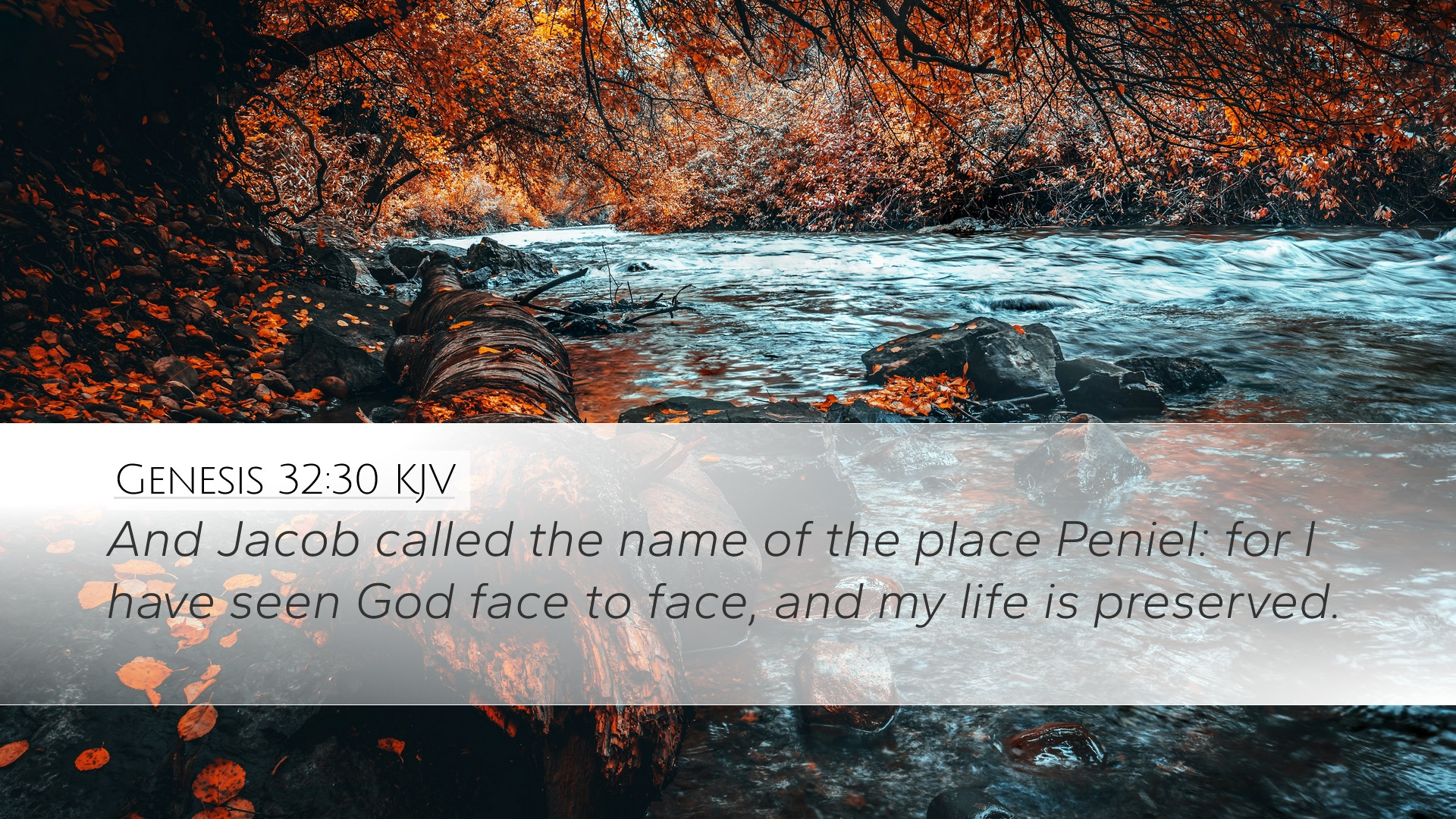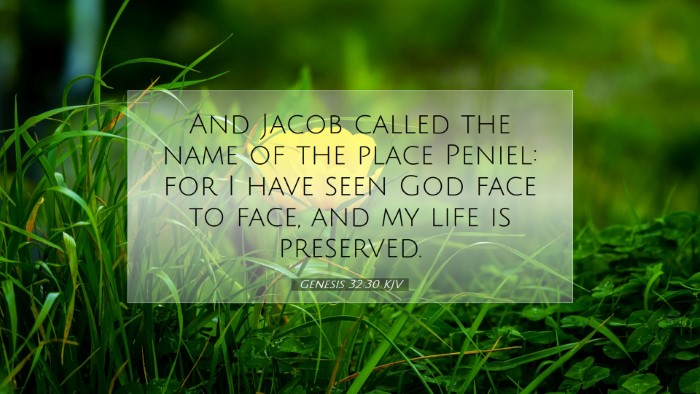Commentary on Genesis 32:30
Verse Text: "And Jacob called the name of the place Peniel: for I have seen God face to face, and my life is preserved."
Introduction
Genesis 32:30 is a pivotal moment in the narrative of Jacob's life, illustrating both a physical and spiritual transformation. This encounter occurs during a critical time in Jacob’s life when he is preparing to confront his estranged brother Esau. The verse highlights Jacob’s declaration of having encountered God, marking a defining moment in his relationship with the divine.
Contextual Overview
To fully grasp the significance of this verse, it is essential to consider its broader context within Genesis 32. Jacob is returning to Canaan after years of exile, during which he has experienced both the blessing and the struggle, including a complicated relationship with his father-in-law Laban. The chapter portrays Jacob wrestling with God at night, symbolizing his internal struggles and the complexities of his character. The name "Peniel," meaning "face of God," reflects Jacob’s acknowledgment of the divine encounter that not only affirms his identity but also assures God's continued covenant with him.
Insights from Commentaries
Matthew Henry
Matthew Henry emphasizes the personal nature of God's revelation to Jacob. He argues that seeing God is a profound experience, but Jacob's acknowledgment that he has seen God "face to face" signifies a moment of truth and transformation. Henry notes that this encounter illustrates God's grace, as Jacob is spared despite the potential consequences of facing an Almighty God.
Albert Barnes
Albert Barnes offers a detailed exegesis of the implications of Jacob naming the place Peniel. He remarks that Jacob's statement reflects both fear and reverence. Seeing God is an overwhelming experience, and it signifies not merely a visual encounter but a deep spiritual engagement. Barnes also highlights the preservation of Jacob’s life as a testament to God's mercy and the fulfillment of His promises to Jacob despite his flaws and past deceptions.
Adam Clarke
Adam Clarke focuses on the theological implications of Jacob's encounter. He posits that this moment symbolizes a transformative experience that leads to Jacob's change of name, as he later becomes known as Israel. Clarke explains that the struggle with God signifies a struggle with one's identity and purpose. In recognizing God’s presence, Jacob finds reassurance and strength to face the challenges ahead, particularly his impending encounter with Esau. This moment serves as not only a personal evolution but also a prophetic declaration of the nation of Israel emerging from Jacob's lineage.
Theological Reflections
This verse gives rise to several theological reflections significant for pastors and theologians:
- The Nature of Divine Encounters: Jacob’s wrestling with God illustrates that divine encounters can be both challenging and transformative. It speaks to the struggles individuals may face in their faith journeys.
- Identity and Transformation: Jacob’s experiences serve as a powerful reminder of how encounters with the divine can reshape our identities and destinies. The shift from Jacob to Israel signifies a new beginning.
- The Concept of Mercy: God’s preservation of Jacob, despite his struggles and fears, highlights the theme of divine mercy present throughout the Scripture.
- The Implications of Names: In biblical times, names could signify character, destiny, and change. Jacob’s naming of the place Peniel reflects an acknowledgment of God’s direct intervention in his life.
Practical Applications
The narrative surrounding Genesis 32:30 offers several practical applications for believers today:
- Wrestle with God: Just as Jacob wrestled with God, believers are encouraged to grapple with their doubts, fears, and challenges in their pursuit of a deeper faith.
- Embrace Transformation: Understanding that God can and does transform us, believers should be open to changes in identity and purpose as a result of their relationship with Him.
- Recognize God's Presence: In the midst of struggles, believers should be mindful of God's presence and His readiness to engage with them, providing strength and assurance.
- Celebrate Divine Encounters: Each encounter with God can be a significant moment worth commemorating, as it often marks a turning point in faith and ministry.
Conclusion
Genesis 32:30 encapsulates a profound moment of personal and spiritual significance in Jacob’s life. The insights provided by public domain commentaries illuminate the rich themes of transformation, mercy, and divine encounters. For pastors, students, and scholars, this passage serves as a reminder of the dynamic relationship between humanity and the divine, encouraging a deeper exploration of how these themes resonate within our own lives and communities.


